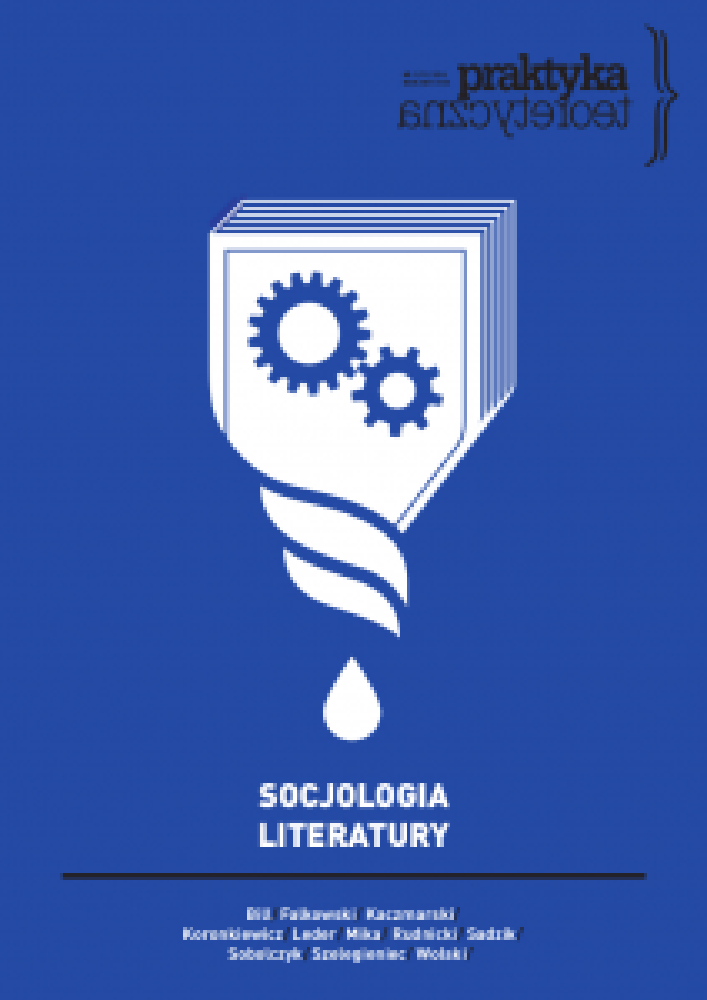Abstrakt
The paper ostensibly refers to Harold Bloom’s categories of the anxiety of influence. Bloom’s theory is treated as an immanentist one, i.e. text/aesthetics/personality-oriented, which is specific to the period in which the theory was developed. However, at least from the 80s of the XXth century, there occurs a visible change towards sociologization of all the human sciences. The paper appropriates and resignificates Bloom’s categories and intermingles them with the concepts of social psychology in order to enable a description of the condition of writers in the current social contextBibliografia
Bersani, Leo. 1995. Homos. Cambridge-London: Harvard University Press.
Bielik-Robson, Agata. 2002. Sześć dni stworzenia. Harolda Blooma mitologia twórczości. In the Polish translation of Anxiety…: Lęk przed wpływem. Teoria poezji. Transl. A. Bielik-Robson, M. Szuster. Kraków: Universitas.
Bloom, Harold. 1976. Poetry & Repression, New Haven: Yale University Press.
Bloom, Harold. 1988. Poetics of Influence. Ed. J. Hollander. New Haven: Henry R. Schwab.
Bloom, Harold. 1997. The Anxiety of Influence. A Theory of Poetry, 2d edition. New York-Oxford: Oxford University Press.
Bourdieu, Pierre. 1995. The Rules of Art. Genesis and Structure of the Literary Field. Transl. S. Emanuel. Stanford: Stanford University Press.
Burke, Kenneth. 1962. Four Master Tropes. In A Grammar of Motives and A Rhetoric of Motives. Cleveland-New York: World Pub.
Butler, Judith. 1993. Critically Queer. GLQ. A Journal of Lesbian and Gay Studies 1.
Butler, Judith. 2006. Preface (1999). In: Gender Trouble. Feminism and the Subversion of Identity, New York-London: Routledge.
Deutsch, Morton, Gerard, Harold B. 1955. “A Study of Normative and Informational Social Influences upon Individual Judgement”. Journal of Abnormal and Social Psychology 51.
Edmundson, Mark. 1999. Nightmare on Main Street. Angels, Sadomasochism, and the Culture of Gothic. Cambridge: Harvard University Press.
Edwards, Jason. 2009. Eve Kosofsky Sedgwick. London-New York: Routledge.
Finkielkraut, Alain. 2005. Nous autres, modernes. Quatre leçons. Paris: Ellipses Marketing.
Freud, Sigmund. 1963. The Economic Problem in Masochism. Transl. J. Strachey. In: General Psychological Theory. Ed. P. Rieff. New York: Scribner Paper Fiction.
Gilbert, Daniel T., Malone, Patrick S. 1995. “The Correspondence Bias”. Psychological Bulletin 117.
Heider, Fritz, Simmel, Marianne. 1944. “An Experimental Study of Apparent Behaviour”. American Journal of Psychology 57.
Hilton, Denis J., Slugoski, Ben R. 1986. “Knowledge Based Causal Attribution: The Abnormal Conditions Focus Model”. Psychological Review 93.
Jameson, Fredrick. 1988. The Political Unconscious. Narrative as a Socially Symbolic Act. New York: Cornell University Press.
Kelley, Harold. 1973. “The Process of Causal Attribution”. American Psychologist 28.
Potkański, Jan. 2008a. Andrzejewski: perwersje wpływu. In: Lektury płci. Polskie (kon)teksty. Ed. M. Dąbrowski. Warszawa: Elipsa.
Potkański, Jan. 2008b. Parabazy wpływu. Iwaszkiewicz, Bloom, Lacan. Warszawa: Elipsa.
Rorty, Richard. 1993. Contingency, Irony, and Solidarity. Cambridge: Cambridge University Press.
Savran, David. 1998. Taking It Like a Man. White Masculinity, Masochism, and Contemporary American Culture. Princeton-New Jersey: Princeton University Press.
Schultz, William R. 1994. Genetic Codes of Culture? The Deconstruction of Tradition by Kuhn, Bloom, and Derrida. New York-London: Routledge.
Sobolczyk, Piotr. 2011. „Trafieni” w wyobrażenia. Podmiotowość pisarza a literatura na zamówienie. In: Podmiot w literaturze polskiej po 1989 roku. Antropologiczne aspekty konstrukcji. Ed. Ż. Nalewajk. Warszawa: Elipsa.
Sobolczyk, Piotr. 2013a. Dyskursy literaturoznawcze a zasady psychologii społecznej. In: Dyskursywizowanie Białoszewskiego. Vol. I. Gdańsk: słowo/obraz terytoria.
Sobolczyk, Piotr. 2013b. Queer: permanentna parabaza subwersji. Forthcoming in print.
Sullivan, Nikki. 2006. A Critical Introduction to Queer Theory. Edinburgh: Edinburgh University Press.
Turner, M. E., Pratkanis, Anthony R. 1994. “Social Identity Maintenance prescriptions for Preventing Groupthink: Reducing Identity Protection and Enhancing Intellectual Conflict”. International Journal of Conflict Management 5.
Vattimo, Gianni. 2003. Postmodernity, Technology, Ontology. In: Nihilism & Emancipation. Ed. S. Zabala. Transl. W. McCuaig. Introd. R. Rorty. New York: Columbia University Press.
Licencja
Autorzy:
„Praktyka Teoretyczna” jest pismem, które chce realizować idee wolnego dostępu do wiedzy i poszerzania domeny dobra wspólnego. Ma służyć rozwojowi nauki i krytycznej refleksji w Polsce i na świecie w imię idei wolnego dostępu do wiedzy (Open Access). Całe pismo jest udostępniane za darmo w Internecie na warunkach licencji CC-BY-NC-SA (Uznanie autorstwa-Użycie niekomercyjne-Na tych samych warunkach 4.0 Międzynarodowe) w wersji 4.0 (szczegółowe warunki: http://creativecommons.org/licenses/by-nc-sa/4.0/). Artykuły w nim zamieszczone mogą być dowolnie przechowywane, kopiowane, drukowane, rozpowszechniane i wykorzystywane do celów naukowo-dydaktycznych przy zachowaniu warunków licencji. Apelujemy tylko o uznanie autorstwa i podanie źródła w myśl przyjętych w środowisku naukowym standardów.
Nie ma natomiast możliwości komercyjnego wykorzystania zgromadzonych zasobów bez pisemnej zgody wydawcy. Dostęp do czasopisma nie może być dystrybuowany za opłatą czy w jakikolwiek inny sposób limitowany przez inne podmioty.
Autorzy tekstów przyjętych do publikacji w czasopiśmie „Praktyka Teoretyczna” są zobowiązani do wypełnienia, podpisania i odesłania na adres redakcji umowy o udzielenie nieodpłatnej licencji do utworów, z zobowiązaniem do udzielania sublicencji CC [PL.pdf, PL.doc, EN.pdf, EN.doc].
Zgodnie z umową, autorzy tekstów opublikowanych w czasopiśmie „Praktyka Teoretyczna” udzielają wydawcy czasopisma niewyłącznej i nieodpłatnej licencji oraz zezwalają na użycie sublicencji Creative Commons Uznanie autorstwa-Użycie niekomercyjne-Na tych samych warunkach 4.0 Międzynarodowe (CC-BY-NC-SA 4.0).
Autorzy zachowują prawa do dalszego, swobodnego rozporządzania utworem.
Autorzy nadsyłanych artykułów powinni upewnić się, czy wykorzystywane przez nich materiały nie są chronione prawami autorskimi na rzecz innych osób i ponoszą odpowiedzialność za ewentualne uchybienia w tym względzie.
